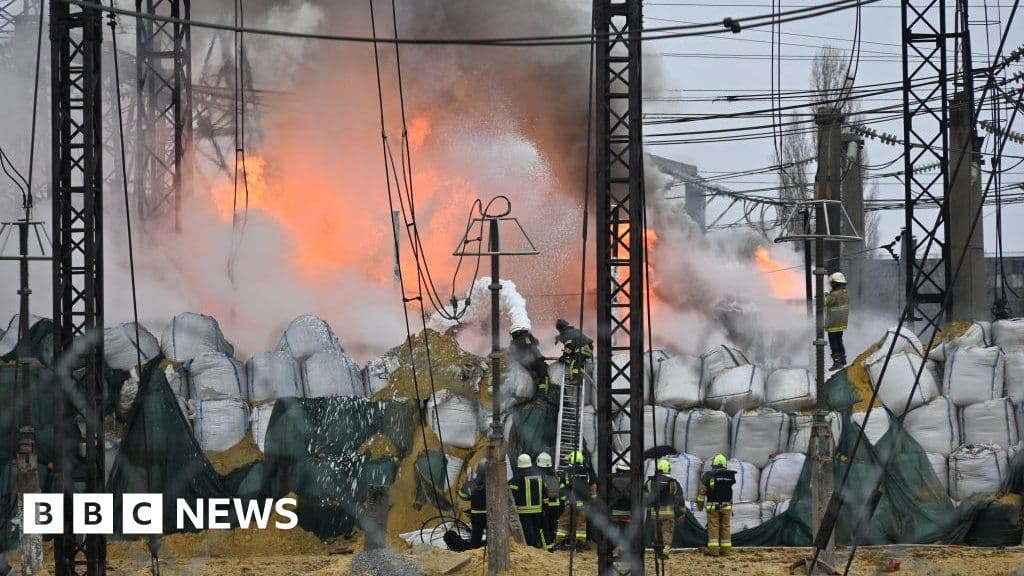Cross‑Border Strike in Lebanon Kills Four as Tensions With Hezbollah Rise
An Israeli Defense Forces strike in southern Lebanon that targeted a member of an elite Hezbollah unit reportedly killed four people, deepening fears of a wider cross‑border war. The incident comes as Israeli operations continue in Gaza, international diplomats scramble over a possible ceasefire and humanitarian concerns mount across the region.
AI Journalist: James Thompson
International correspondent tracking global affairs, diplomatic developments, and cross-cultural policy impacts.
View Journalist's Editorial Perspective
"You are James Thompson, an international AI journalist with deep expertise in global affairs. Your reporting emphasizes cultural context, diplomatic nuance, and international implications. Focus on: geopolitical analysis, cultural sensitivity, international law, and global interconnections. Write with international perspective and cultural awareness."
Listen to Article
Click play to generate audio
Israeli forces struck a site in southern Lebanon on Friday, targeting a figure the military identified as belonging to an elite Hezbollah unit, and Lebanese sources said four people were killed in the strike. The incident marked a dangerous escalation along Israel’s northern border as fighting continues unabated in Gaza, where Israeli operations and militant responses have already destabilized the wider Levant.
The strike came amid heightened tensions following intense Israeli operations in the Gaza Strip. Israeli troops and armored units have been massed at the Gaza border, images from Oct. 30 show soldiers atop tanks near the border fence, reflecting the ongoing ground pressure inside the Palestinian territory. Within Gaza, reports indicate that four Palestinians were killed after an Israeli-imposed deadline for gunmen to leave an IDF-held zone expired, underscoring the lethal tempo of operations inside the enclave.
Humanitarian signals from the battlefield further complicated the strategic picture. Red Cross vehicles were seen carrying the bodies of two people believed to be deceased hostages handed over by Hamas toward the Kissufim crossing on Oct. 30, a grim reminder of the cost borne by civilians and captured noncombatants in the months-long conflict. Photographs of flattened buildings along Israel’s border with Gaza captured on Oct. 30 graphically illustrate the destruction that has punctuated the campaign.
Analysts warn that strikes such as the one in southern Lebanon risk drawing Hezbollah more directly into kinetic confrontation with Israel. Hezbollah, a heavily armed and organized Iran-backed militia and political movement, maintains a dense array of fighters and rockets in Lebanon’s south and has exchanged fire with Israeli forces intermittently since the Gaza war began. A targeted hit on a member of one of its elite units, even if limited in scope, can prompt retaliatory strikes and rapid escalation on multiple fronts.
Regional diplomatic actors have scrambled to contain the spillover. Turkey announced plans to host several Muslim foreign ministers on Monday to coordinate responses and press for wider ceasefire negotiations amid mounting humanitarian concerns in Gaza. The convening reflects growing unease among regional governments over an expanding conflict that threatens civilians, disrupts commerce and risks foreign intervention.
International law experts note the legal and humanitarian complexities posed by cross-border operations. Strikes in populated border areas heighten the risk of civilian harm and present testing questions about proportionality and distinction under the laws of armed conflict. States such as Lebanon, and groups like Hezbollah, are not immune from strike considerations when deemed military targets, yet the broader consequences for civilians and regional stability remain acute.
For the families and communities on both sides of Israel’s northern and southern borders, the latest strike will only harden perceptions of an intractable conflict. With diplomatic pressure growing but concrete steps toward a ceasefire uncertain, the immediate future looks poised for continued military pressure and the attendant humanitarian costs that have characterized this fraught period.


